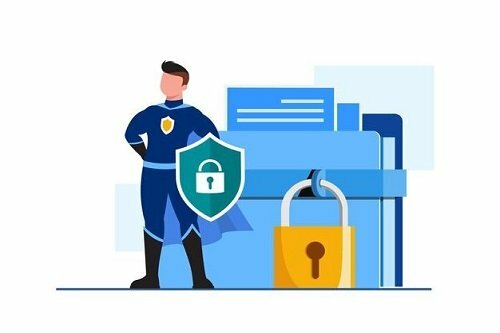Table of Contents
- What is ethical hacking?
- What is the difference between malicious hackers and ethical hackers?
- What do ethical hackers do?
- Why is ethical hacking valuable?
- Ethical hacking subjects
- Ethical hacking course eligibility
- Things to ensure while applying for universities abroad
- Top universities for ethical hacking courses
- Skills required for an ethical hacker
- Career options
- Salary of ethical hackers
- In conclusion
- FAQs
Computer and information technology (IT) related courses have witnessed a massive surge in demand in the past decade. However, one of the offbeat courses that have piqued the most interest in students is ethical hacking.
What is ethical hacking?
Simply put, it is the activity of legally replicating the actions of a malicious hacker to test the security and integrity of information technology (IT) systems and infrastructure. In addition to this, ethical hacking tests the strength of firewalls developed to keep the real hackers at bay.
What is the difference between malicious hackers and ethical hackers?
Basically, the difference between malicious and ethical hackers is that the former attempts to gain unauthorized access to encrypted files and data while the latter gains authorized permission to help prevent an unauthorized breach.
Alternatively, ethical hacking is also known as white hat hacking. As a matter of fact, it has recently become a mainstream profession wherein ethical hackers are increasingly being employed by large multinational corporations (MNCs) to test the security of their IT infrastructure.
What do ethical hackers do?
Authorized hacking has significantly gained a lot of interest and importance in the corporate world. For the most part, ethical hackers are responsible for –
- Obtaining encrypted information to identify loopholes in a security system.
- Evaluating flaws in the system configuration of the IT infrastructure.
- Finding the root cause of the security lax (software or hardware related).

Why is ethical hacking valuable?
Ethical hacking is a valuable service because ethical hackers document their methods of breaching a system and prepare reports that can help an organization improve its data security. Moreover, ethical hackers also maintain post-service contact with their clients by providing follow-up guidance and feedback on the fixed issues.
Unsurprisingly, ethical hackers have become even more important today. This is because of the Payment Card Industry Data Security Standard (PCI-DSS) protocol. According to the protocol, companies need to conduct routine system security breach tests for maintaining data privacy. And as has been noted, most B2C and B2B companies are now implementing such online payment gateways for their customers. Enter ethical hackers.
Ethical hacking subjects
Now that you know all about ethical hacking, let us move on to what you will learn during the course. Although the subjects may differ from university to university, here are some of the most common ones –
- Introduction to ethical hacking
- Virus and worms
- Linux hacking
- Physical security
- Session hijacking
- Footprinting
- Legality and ethics
- Python programming
- Basic statistical techniques for computer science
- Programming in C, C++, Java, etc.
- Fundamentals of digital communication systems
- Database management systems
- Digital forensics
- Cyber Threat Intelligence
- Cryptography and Secure Communication
- String and File Manipulation
In addition to these, there are many more courses included in the white hat hacking course.
Ethical hacking course eligibility
Since the ethical hacking course falls under the broader category of information technology (IT), you will need a degree in IT to be eligible for this course.
For a diploma, certificate, or graduation course: You have to complete your high school with pure science subjects (including mathematics). Additionally, you have to pass the required entrance exams for each of these universities.
However, to enroll in a white hat hacking course at the postgraduate or postgraduate diploma level, a Bachelor’s degree in Computer Science or IT can open up the path for you.
And if you are planning to enroll in an ethical hacking course abroad, then there are additional eligibility criteria that you have to meet, including-
- Statement of Purpose
- The Letter of Recommendation
- Transcripts
- Curriculum vitae
- Proof of language proficiency (TOEFL, IELTS, or PTE test scores)
- Aptitude test scores
Things to ensure while applying for universities abroad
Although the requirement may vary from country to country, here are a few common things that you must ensure while applying to study abroad –
- You have to apply for a student visa to the country where you want to pursue this course.
- In addition to this, you have to write a statement of purpose (SOP) to the respective embassy.
- You need to have an acceptance letter from the university. Additionally, you have to submit a copy to the respective embassy.
- For the visa approval process, you have to undertake one or two rounds of a personal interview.
- Lastly, if the university is in an English-speaking country, then ensure moderately high scores in TOEFL or IELTS exams.

Top universities for ethical hacking courses
Due to the high demand for ethical hackers, there are many universities that offer white hat hacking courses. However, here are the top universities for ethical hacking that you should know –
| University name | Name of the course | Course Fees | Duration of the course |
| Abertay University, United Kingdom | Ethical Hacking BSc (Hons) | #14,000 per year | 4 years |
| UK’s Abertay University | White Hat Hacking and Cyber Security MSc/PGDip | Yearly – #17,000 | 1 year |
| Dakota State University, United States | Graduate Certificate in Ethical Hacking | $465 per credit hour | 9 hours |
| Coventry University, United Kingdom | BSc (Hons) in Ethical Hacking and Cyber Security | Per year – #17,700 | 3 years |
| Seneca College, Canada | Network Defense and Ethical Hacking | USD 348.20 | 3 months |
| Dublin Business School, Ireland | Diploma in Ethical Hacking | Undisclosed | 12 weeks |
| University of Coventry, UK | Cybersecurity and Ethical Hacking MSc | Annually #17,700 | 48 months |
Skills required for an ethical hacker
Since ethical hacking pertains to computer systems and networks, you must have a good grasp of these subjects. However, here are some other skills that can enhance your practice as an ethical hacker.
- Knowledge of Linux operating systems.
- Programming skills in Python, SQL, C, JavaScript, PHP, C++, Java, Ruby, and Perl.
- Basic hardware knowledge, including awareness of different networking hardware.
- In addition to basic coding, you should be familiar with reverse engineering computer code.
- Cryptography skills that can enable you to decrypt messages and data.
- Additionally, you also need to have database skills that can help you scour databases for information.
- Problem-solving skills to help you get to the root of a problem and suggest solutions for the same.
Liked this blog? Read Top 10 STEM courses of the year!
Career options
Here are a few career paths you can choose after graduating with a specialization in ethical hacking-
- Cyber security architect. Design, create, and maintain security systems of the organization.
- Information security lead. Control management access to systems. In addition to this, prevent malicious breaches.
- Cyber security engineer. Design and deploy network security solutions that prevent cyber attacks. Additionally, monitor all network systems to ensure smooth functioning.
- Security consultant. Basically, carry out various tasks. But not as a regular employee. Here you will be an expert consultant who provides advice and suggestions.
- Mobile application security executive. For the most part, you have to involve with a larger team to test and troubleshoot mobile applications.

Salary of ethical hackers
Undoubtedly, ethical hackers earn a lucrative package. However, in order to get that, ethical hackers need to be highly skilled in their subjects. Here are the entry-level salaries you can expect after completing an ethical hacking course-
- USA – $102,400 per year
- UK – #45,000 per year
- Canada – $84,979 per yea
- Singapore – SG$81,600 per year
- Australia – $102,383 per year
- Germany – ⚬40,000 per year with benefits
In conclusion
As a matter of fact, completing a course from a foreign university is usually considered valuable, regardless of the country. Because it gives you international exposure and helps you develop a world view on your subject.
Additionally, if you choose to enroll in an ethical hacking course from any of the universities mentioned here, you can get in touch with us to ensure a smoother admission process. We will help you secure a bright future as an ethical hacker and can even assist you in making your name amongst the Silicon Valley geniuses.
FAQs
Q1. Which ethical hacking course is best?
Answer – Basically, all the white hat hacking courses mentioned here are among the best in the world. However, it depends on your capacity because this discipline is quite complex and may not be for everyone. Hence, choose carefully.
Q2. Does ethical hacking require coding?
Answer – As a matter of fact, yes! Ethical hacking is a stream of the IT industry. To be able to hack, you should have a robust knowledge of the several computer programming languages mentioned in this blog.
Q3. Is ethical hacking an efficient career?
Answer – As businesses are going digital and beginning to accept digital forms of payment, malicious hacking has become a menace more than ever before. Because of this, the demand for ethical hackers is on the rise. They can help prevent the risk of digital sabotage. Hence, ethical hacking is an efficient career with excellent prospects for the future. In addition to this, the field is pretty lucrative.






